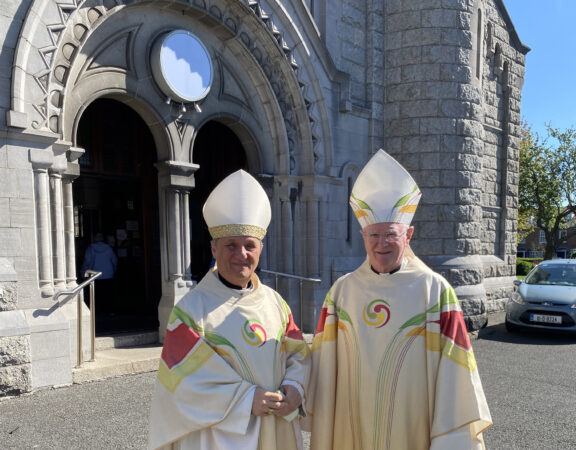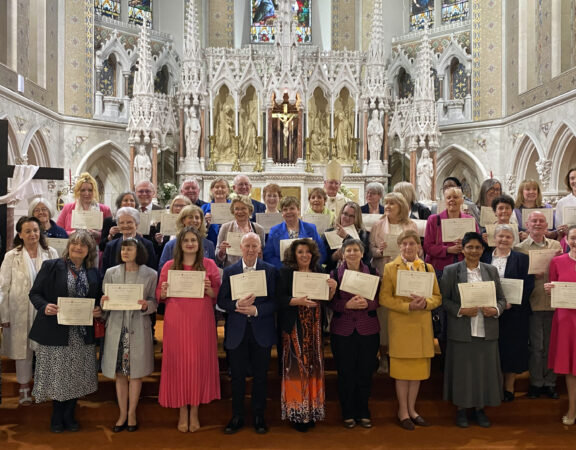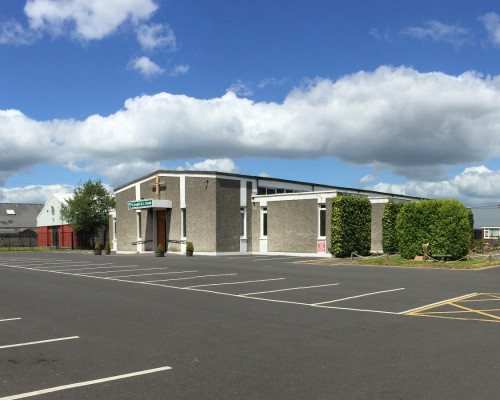Twenty Second Sunday of the Year 2014
TWENTY FIFTH ANNIVERSARY OF THE OPENING OF
SAINT MAUR’S CHURCH RUSH, 1989-2014
Homily notes of Most Rev. Diarmuid Martin Archbishop of Dublin
Saint Maur’s Church, Rush, 31st August 2014
“We celebrate the 25th anniversary of the opening of this Church of Saint Maur and we celebrate the life of faith which has grown up and developed in and around this Church and its predecessors since the 1700’s: a faith which is the fruit of generations of Christians who have lived and worshiped and witnessed to their faith in Rush itself and in the surrounding town lands.
We celebrate 25 years in which this community has grown and changed. Just think, that in the five years between the last two censuses, which is from 2006 to 2011, the number of Catholics in this parish grew from about 7,000 to practically 9,000, an increase of almost 30%. The number of baptisms in this parish is almost 5 times the number of funerals. This means that this is a young and growing parish and therefore also a very lively parish. For this we give thanks to God today.
This also means that as we celebrate an anniversary of the past, the Church community is very much called to look towards the future and to work to ensure that the faith which gave successive generations the foresight to build the various parish Churches, will continue to live on strongly among the generations to come. We pray especially that the many young people of this parish will experience, through the way we live our faith, something of what is best in the life of faith in Jesus Christ and will have those good experiences of faith and of Church life which we had at vital moments in our lives.
The parish is blessed with great schools, both on the primary and the secondary level, and also with a great tradition and a community spirit, where those who have lived here for generations and those who have come here more recently work together to build a flourishing Rush for the future.
I would like to mention especially today your outgoing Parish priest, Father Kieran Coughlan, who worked hard to prepare these celebrations and who has contributed so much to the life of the parish over the past eight years. We wish him God’s blessing in his new pastoral responsibilities. With him I would mention Father Seamus Cullen, the Parish Pastoral worker, Mary Kirk, the Parish Pastoral Council and all those who work in so many ways within the Church and in the parish. I know that you will offer a warm welcome to the new Parish Priest.
It is not easy to be an authentic Christian in today’s world. There are many factors which have contributed to this. But we have to remember that it has never been easy to be an authentic Christian believer. We see that even among the very first disciples of Jesus, as we heard in today’s Gospel.
In last week’s Gospel reading, Saint Peter was clear in his recognition that this Jesus with whom he and the other disciples had been journeying for some years was really the Messiah about whom the prophets had spoken. Jesus, however, tells his disciples not to speak of this, because he knew that this insight of Peter would have been misunderstood by those around him. Being a Christian is not just about words; it is not just about externally professing Jesus as Lord, It is first of all about discerning who Jesus really is and what he calls us to be and to do. That discernment must use particular criteria: it must be based not on our terms alone, but it must attempt to understand how God himself reveals himself to us. We do not create a God who appeals to us; we must open ourselves to God’s way of thinking which changes us.
Jesus, the just man, lived in a world marked by injustice and he realised that his obedience to his Father will inevitable lead him to his death. This is something that his disciples do not understand. They have their own idea of what the Messiah should be like. They are indeed not willing even to try to understand what Jesus is saying, to the point that Jesus has to tell Peter that he is becoming an obstacle because he thinks in terms which are more those of Satan than those of God. These are strong words indeed.
What then is the way of Jesus? It is the way of obedience to his Father. Obedience is a difficult concept for us to accept. For us the idea of living in obedience to someone else appears as something that denies our individuality and our humanity. We seek a self-fulfilment which is often described principally in terms of me as an individual. We are all tempted to place our needs as the crucial measure of what is important to us.
That temptation is not just personal to each of us. We can create communities which are self-centred and inward-looking. The Church too can become over focussed on itself, its structures and the mechanics of its structures, rather than witnessing to what is essential.
We can only understand what obedience to God means when we understand who God is. Our God is a God of love and obedience to God can never then be just about obeying rules and norms. Obedience to God means living a life in which we respond in love to those around us and to the world around us. Obedience to God means realising that we find fulfilment in love not through being narcissistic and self-centred, but through giving ourselves in love, as Jesus showed his love even through accepting an unjust death.
Love is not easy. All of us know, for example, the extraordinary love of parents in today’s world and in our communities who give themselves totally so that their children can do better than they did themselves. We know the love of parents which continues even in the face of apparent opposition and failure. Such parents give us all a lesson in what love is about. Indeed, the Church must find new ways of listening to the special witness of married couples which, based on living out of their Sacrament of Matrimony, can often be a true source of theological reflection. The Church does not just teach married couples; married couples inform Church teaching. This is something which should be taken up at the forthcoming Synod of Bishops.
On the other hand, today as we look around us and at our world, we see the opposite of love; we see what hatred can create and do to the lives of those who are its victims. These recent weeks have been weeks of extraordinary and frightening violence and cruelty on the world scene, especially in the Middle East. I would ask you all to pray this morning for our Irish peace-keeping troops around the world and for the families.
We see how a culture of hatred and fanaticism challenges world peace. We see it nearer home. There are sadly many examples of hatred and blatant disregard to the lives of others in our own country. Think of the numbers of murders and shootings which now take place in Ireland. Think of the sense of revenge which that hatred generates. Think of those who are trafficked and exploited.
A Church called to live in obedience to the God revealed in Jesus Christ has to be a community where Gods’ love is ever more vividly reflected. It has to become a community within which the law of love dominates. It has to become the place where young people learn the fact that you never really flourish as a person when you only think of yourself.
One of the many images which Pope Francis uses is that of the doors of the Church. He reminds us that the doors of our Churches must remain open so that people can enter and encounter the healing power of Jesus. They must be doors which do not have invisible security screens which try to keep out those whom we may not like or may be different. They must be doors which are not one-way, which tempt us to remain enclosed within the Church building as a Church just of the comfortable and the like-minded. Finally the doors of the Church must be open so that those who encounter the message and the love of Jesus in word and sacrament can go back out into the harsh world bringing a witness to the care and the love of Jesus.
For the past twenty five years this Church and its community have attempted to be that kind of Church: a community where faith is deepened through listening to the word of God and within which that same word of God makes them ever more sensitive to the needs of others, their physical need but also their need for hope and meaning and purpose within a complex world, a need which will only be fulfilled through knowing and following and being sustained by Jesus Christ.ENDS









